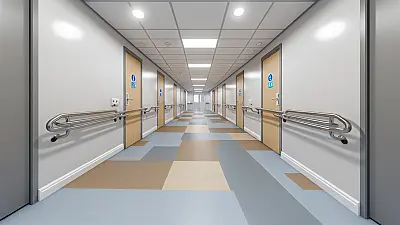SPOKANE, WA - State health inspectors have documented ongoing deficiencies in fall prevention and monitoring protocols at Manor Care Health Services-Spokane, with violations dating back over a year despite attempted corrective measures by facility leadership.

Pattern of Inadequate Fall Monitoring Persists Despite Intervention
The facility's recurring failure to properly monitor residents after falls represents a significant departure from standard nursing home care protocols. Documentation reveals that similar deficiencies were identified during the annual recertification survey on January 19, 2024, and again during a complaint investigation on May 29, 2024, before the most recent inspection on April 24, 2025.
When residents experience falls in nursing facilities, immediate and sustained monitoring becomes critical to identify potential injuries that may not be immediately apparent. Delayed detection of injuries such as head trauma, internal bleeding, or fractures can lead to serious medical complications. The standard protocol requires systematic assessment including neurological checks, vital sign monitoring, and observation for changes in behavior or physical condition over the following 24-72 hours.
The facility's approach to addressing these deficiencies raises concerns about the effectiveness of their quality improvement measures. According to the inspection report, Staff A stated during an interview on April 24, 2025, at 1:17 PM: "they were not aware there were concerns with monitoring after falls occurred." This statement indicates a fundamental breakdown in communication and training within the facility's nursing department.
Questionable Performance Improvement Implementation
The facility had attempted to address the fall monitoring issues through a Performance Improvement Plan (PIP) completed by the previous Director of Nursing in December 2024. This plan included staff audits and education initiatives aimed at improving post-fall care protocols. However, the effectiveness of these measures appears limited.
Staff A reported that the former Director of Nursing "felt the PIP was successful as they reduced their number of falls from 28 to 23 and they no longer needed to do a full QAPI on falls." This reduction from 28 to 23 falls represents only an 18% decrease, which falls short of industry benchmarks for successful fall prevention programs. More concerning is the decision to discontinue comprehensive Quality Assurance and Performance Improvement (QAPI) measures based on this modest reduction.
Industry standards dictate that fall prevention programs should achieve at least a 30% reduction in fall rates to be considered effective. Additionally, discontinuing QAPI monitoring prematurely can lead to regression in care quality, as evidenced by the continued citations for similar deficiencies.
Medical Implications of Monitoring Failures
The failure to properly monitor residents after falls can have severe medical consequences. Post-fall syndrome, a condition where elderly individuals develop fear of falling again, can lead to decreased mobility, muscle weakness, and increased risk of future falls. Without proper monitoring and intervention, this creates a dangerous cycle of declining physical function.
Furthermore, undetected injuries from falls remain a leading cause of morbidity in nursing home populations. Subdural hematomas, for example, may not present symptoms for hours or even days after a fall. Hip fractures, if not promptly diagnosed and treated, can result in permanent mobility impairment and significantly increased mortality risk within the first year following injury.
Additional Issues Identified
The inspection report references additional deficiencies under regulation F658, suggesting broader systemic issues with the facility's care delivery systems. The reference to care conferences indicates potential problems with interdisciplinary team communication and care planning processes, which are essential components of comprehensive resident care.
The repeated nature of these citations over a 15-month period demonstrates a concerning pattern of non-compliance with federal nursing home regulations. This timeline suggests that despite multiple opportunities for correction, the facility has struggled to implement sustainable improvements to their fall prevention and monitoring protocols.
For complete details about all violations and the facility's response plan, readers should review the full inspection report available through state health department records.
Full Inspection Report
The details above represent a summary of key findings. View the complete inspection report for Manor Care Health Services-spo from 2025-04-24 including all violations, facility responses, and corrective action plans.
💬 Join the Discussion
Comments are moderated. Please keep discussions respectful and relevant to nursing home care quality.